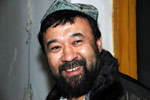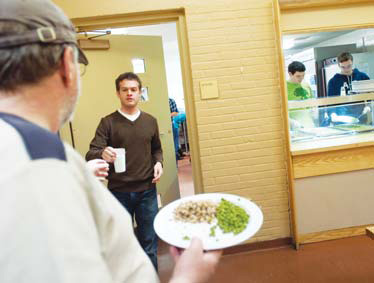Society
Students give homeless help at Harvard shelter
Updated: 2011-02-21 07:36
By Mark Pratt (China Daily)
|
|
CAMBRIDGE, Massachusetts - As darkness falls on Harvard Square, students wrapped tight against the freezing cold hustle down icy, red-brick sidewalks and past snow banks, eager to reach the warmth of dorms and libraries.
One man, underdressed in a light jacket and baseball hat, paces impatiently at the basement door of the University Lutheran Church.
He's waiting for the Harvard Square Homeless Shelter to open.
Every night from Nov 15 to April 15, the shelter brings together students from one of the world's wealthiest and most prestigious universities with neighbors struggling to survive on the fringes of society. It touts itself as the only homeless shelter in the United States run entirely by college students.
"When I got on campus, I saw a really strong juxtaposition between the wealth, prestige and power of the university compared with the plight of so many people in the square," said Jonathan Warsh, who in addition to being co-administrative director of the shelter is a senior from Bloomfield Hills, Michigan, studying government and health policy. "It's too easy to get trapped in the ivory tower."
The emergency shelter opened in 1983. The church, though not affiliated with Harvard, is surrounded by university buildings in the heart of Harvard Square, as the neighborhood around the university is known. The church rents the space to the shelter for a nominal fee that covers expenses.
The shelter has 24 staff members, all Harvard undergraduates, as well as about 200 other volunteers, mostly students. The shelter has an annual budget of $60,000. The money comes from sources including state and federal grants, the shelter's own fundraising arm, area businesses, and volunteer alumni. It has beds for 20 men and four women and is full to capacity and beyond each night.
The students handle every aspect of running the shelter: keeping track of money, procuring food and other donations, cooking, washing dishes and sweeping. In addition to the dining and sleeping area, there's a small library and computer room, men's and women's showers, a laundry room, and a kitchen.
"These kids are awesome," said a shelter guest who wanted to be identified only as Kevin out of worries his family would find out he was homeless. "I wouldn't be able to do anything without this place."
The shelter is where classroom theory meets reality, said Scott Seider, an assistant education professor at Boston University who volunteered at the shelter while a Harvard undergrad in the late 1990s.
"This place serves as a cauldron of leadership development," he said. "People here learn how to run a complex organization."
The shelter is only for sober, childless adults; people who don't fit that bill are referred to other shelters.
The volunteers are trained in conflict resolution, in case guests have a dispute, and they learn how to deal with recovering addicts, people with mental health issues and the disabled. Guests in the past have included people in wheelchairs and on respirators, co-director Luci Yang, a senior from Cleveland who's studying economics and psychology, said.
The economy and a harsh winter have made the shelter's services more important than ever this year, Yang said.
"Demand has definitely gone up since the recession and the housing crisis," said Yang.
The student staff doesn't just provide a warm bed and a hot meal for the night. They help people apply for food stamps; help them find permanent housing, healthcare and jobs.
Co-directors Warsh and Yang estimate they put in 15 to 25 hours per week at the shelter on top of their demanding academic schedules. Most volunteers put in just a few hours per week.
Associated Press
Specials

Spring Festival
The Spring Festival is the most important traditional festival for family reunions.

Top 10
A summary of the major events both inside and outside China.

A role model
Alimjan Halik had been selected as the "Cyberspace Personality Who Moved the Hearts of the Chinese in 2010".
